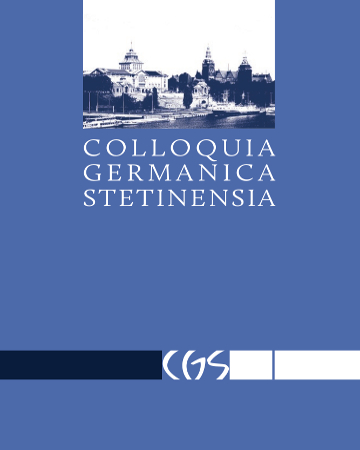







| Year of publication: | 2021 |
| # | Title | Page range | Authors | Actions |
|---|---|---|---|---|
| * |
Redaktionsseite(Editorial page) |
1 (2-2) | --- | More |
| * |
Inhaltsverzeichnis(Table of contents) |
2 (3-4) | --- | More |
| 1. |
Das schwierige Erbe und die Erinnerungspflicht in "Topografie der Erinnerung" von Martin Pollack(The difficult legacy and the obligation to remember in the "Topography of Remembrance" by Martin Pollack) |
17 (5-21) | Joanna Bednarska-Kociołek | More |
| 2. |
Zwischen Verbannung und Heimat. Zum kulturellen Selbstfindungsprozess bei in der Schweiz lebenden Zugewanderten am Beispiel Franco Supinos Erzähltextes "Musica Leggera"(Between exile and homeland. Paths to cultural self-discovery among those migrated people living in Switzerland depicted on the basis of the narrative text "Musica leggera" by Franco Supino) |
20 (23-42) | Adam Sobek | More |
| 3. |
Funktionen des Artikels in verbal-nominalen Gruppen mit Akkusativobjekt (anhand des Sprachsystems und der Narration/Corpora)(Functions of Articles in verbal groups with accusative object (in Language System and Narration)) |
16 (43-58) | Olga Kostrova | More |
| 4. |
Die Präposition ‚na‘ im Polnischen und Ihre Äquivalente im Deutschen – eine strukturell-lexikalische Analyse(The preposition ‚na‘ in Polish and its equivalents in German – a structural-lexical analysis) |
14 (59-72) | Katarzyna Ochmańska | More |
| 5. |
Die polnische Präposition 'na' in der Rechtssprache und ihre Entsprechungen im Deutschen(Polish preposition ‘na’ in legal language and its equivalents in German) |
17 (73-89) | Małgorzata Osiewicz-Maternowska | More |
| 6. |
Zur Polysemie der Präposition AUF aus kognitiver Sicht(The polysemy of the proposition AUF from the cognitive point of view) |
21 (91-111) | Anna Sulikowska | More |
| 7. |
Pejorative Lexik im Bereich der Wahrnehmung – eine lexikographische Analyse des Deutschen und Polnischen(Pejorative lexis in the perceptual domain – a lexicographical analysis of German and Polish) |
26 (113-138) | Przemysław Staniewski | More |
| 8. |
Zum Einfluss fremder Morpheme auf die deutsche Sprache aus der Zeit der SARS-CoV-2-Pandemie(On the influence of the foreign language morphemes on the german language from the time of the sars-cov-2 pandemic) |
16 (139-154) | Piotr Owsiński | More |
| 9. |
Geflügelte Worte in der deutschen Sprache. Ihre Form, Bedeutung und Herkunft(Winged Words in German Language. Their Form, Meaning and Origin) |
12 (155-166) | Katarzyna Sztandarska | More |
| 10. |
Gespaltenes Polen? Zu der Polarisierung in der polnischen Gesellschaft und ihrer sprachlichen Realisierung anhand deutscher Pressetexte über die Präsidentenwahl im Juli 2020 in Polen(Poland divided? On the polarization in the Polish society and its language realisation on the basis of German press articles about the presidential election in July 2020 in Poland) |
17 (167-183) | Krzysztof Matyjasik | More |
| 11. |
Kognitive und affektive individuelle Merkmale von Fremdsprachenlernenden. Fokus: Polnische Germanistikstudenten(Cognitive and affective individual characteristics of foreign language learners. The case of Polish students of German philology) |
16 (185-200) | Krystyna Janaszek | More |
| 12. |
Die Textsorte „medizinischer Lehrtext“ aus diachronischer Perspektive: die Darstellung von Alessandra Zurolo am Beispiel deutscher medizinischer Texte vom 13. bis zum Beginn des 19. Jahrhunderts(The text type “medical didactic text” from a diachronic perspective: presentation by Alessandra Zurolo on the example of German medical texts from the 13th to the beginning of the 19th century) |
14 (201-214) | Marcelina Kałasznik | More |